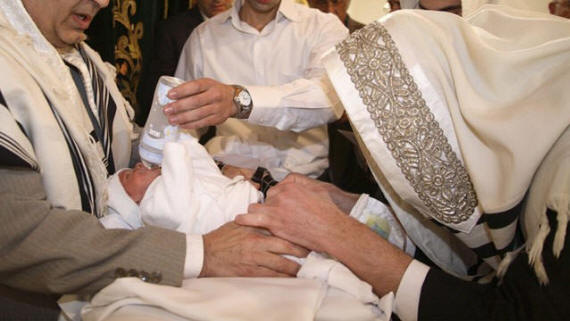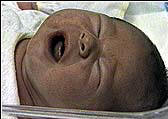
Baby Dies of Herpes in Ritual Circumcision By Orthodox Jews
ABC News, U.S.A., by Susan Donaldson James, March 12, 2012
New York City is investigating the death last September of a baby who contracted herpes after a "ritual circumcision with oral suction," in an ultra-Orthodox Jewish ceremony known in Hebrew as metzitzah b'peh.
In a practice that takes place during a ceremony known as the bris, a circumcision practitioner, or mohel, removes the foreskin from the baby's penis, and with his mouth sucks the blood from the incision to cleanse the wound.
The district attorney's office in Kings County Brooklyn is investigating the death of the 2-week-old baby at Maimonides Hospital, but would not disclose the name of the mohel or whether there would be a prosecution.

"We are looking into it, that's all I can say," a D.A. source told ABCNews.com.
The 5,000-year-old religious practice is seen primarily in ultra-Orthodox and some orthodox communities and has caused an alarm among city health officials. In 2003 and 2004, three babies, including a set of twins, were infected with Type 1 herpes; the cases were linked to circumcision, and one boy died.
The mohel who performed the procedures, Yitzchok Fischer, was later banned from doing circumcisions, according to The New York Times. It is not known if he was involved in this recent death.
"It's certainly not something any of us recommend in the modern infection-control era," said Dr. William Schaffner, chair of preventive medicine at Vanderbilt University.
"This is a ritual of historic Abraham that's come down through the ages, and now it has met modern science," he said. "It was never a good idea, and there is a better way to do this." (The modern Jewish community uses a sterile aspiration device to clean the wound in a circumcision.)
In the 2004 death and the more recent one, a mohel infected the penile wounds with Type 1 herpes I (HSV-1), which affects the mouth and throat. It is different from Type 2 or genital herpes (HSV-2), which is a sexually transmitted disease and can cause deadly infections when a newborn passes through an infected birth canal.
Neonatal herpes is "almost always" a fatal infection, according to Schaffner. "It's a bad virus. [Infants] have no immunity and so it's a very serious illness. Now we have another death -- an unnecessary, incredibly tragic death."
Infections are rare, according to a 2009 study in the New England Journal of Medicine, affecting only one infant in 3,200 births. But it is a serious infection, with a fatality rate of about 64 percent even with antiviral treatment. And fewer than 20 percent of those who survive develop normally.
Schaffner was a medical consultant in the 2004 death of the twin, when city and state officials butted heads with religious leaders who defended their freedom to continue the traditional practice.
"Unfortunately, adults can carry the herpes virus without any symptoms," he said. "Applying the mouth to an open wound can transmit the virus, which can disseminate throughout the body of the infant."
Type 1 herpes is common, and 90 percent of all Americans have experienced infection by the age of 50, the vast majority without symptoms, according to Principles and Practice of Infectious Diseases.
About two-thirds of all infant boys born in New York City's Hasidic communities, who are ultra-Orthodox, are circumcised in the oral suction manner, according to Rabbi David Zwiebel, executive vice president of Agudath Israel of America.
"Of course the community is deeply saddened by this terrible tragedy," he wrote to ABCNews.com in an email.
"We really don't know any of the details as yet," he wrote. "Who was the mohel? Did he take the hygienic precautions prescribed by the NYC Health Department in the 2006 protocol it entered with rabbinic leaders of the Orthodox community, which are designed to reduce the risk of transmitting infection?
"Did health officials perform the type of investigation described in the protocols to ascertain the source of the infection? What were the results of any such investigation? It is difficult for us (and should be difficult for anyone else) to comment publicly on this tragedy or to draw any firm conclusions."
Zwiebel said the Orthodox community was "increasingly attuned" to health risks and to the importance of following safety steps.
Earlier this week, he told the New York Times that mohels were aware of the health risks and hygienic practices and warned that regulation could send them "underground."
But New York's The Jewish Week exclusively reports that the protocols that were agreed upon by a "broad array" of orthodox rabbis and health officials after the 2004 death were rescinded only a year later in 2007.
The city required one of three things, at the mohel's option: continue abstaining from the practice until he could be ruled out as the source of infection; agree to take anti-viral medication for the rest of his life; or take medication for three days before the circumcision.
The state health department dropped those protocols when a new governor --- then Democrat Eliot Spitzer -- took office and a new health commissioner was appointed.
The newspaper reports that the metzitzah b'peh practice is still "in widespread use."
The numbers of ultra-Orthodox Jews are growing rapidly, according to a study by University of Florida geography professor Joshua Comenetz, mostly because they have so many children.
He completed the first population survey based on the 2010 U.S. Census, estimating there were about 180,000 or 3 percent of the total number of Jews in the U.S.
In New York City, home to about 100,000 Orthodox Jews, the communities are reclusive, but they're also powerful voting blocks. Public officials try to work closely with their leaders to educate them about modern health practices and to encourage changes in a religious practice that is largely unregulated.
"Reluctance is a matter of respect," said Schaffner. "But then we have the occasional infant who succumbs."
If the mohel has an infection in the mouth and throat, the virus is transmitted to a baby's circumcision wound directly through saliva. From an inflamed wound, it can get into the bloodstream and travel to the brain, causing dangerous encephalitis and either brain damage or death.
The herpes virus is so contagious that when medical professionals give mouth care to patients, they wear gloves, according to Schaffner.
"If they don't, nicks around the nails can be infected with the patient's herpes virus," he said. "They can get bad infections on the fingers."
During the investigation of the 2004 death, rabbis proposed health safeguards, "but none of them provide assurances of safety," according to Schaffner.
One was to use an antiviral medication on the infant's wound, treatments that have not been tested for that purpose. The other was to use an antibiotic cream, which is ineffective against a virus.
"The standard is looking for zero infection and even if there is one, it's unacceptable," said Schaffner. "[The orthodox community] has a hard time getting their brains around this. The ancients are simply wrong about this."






